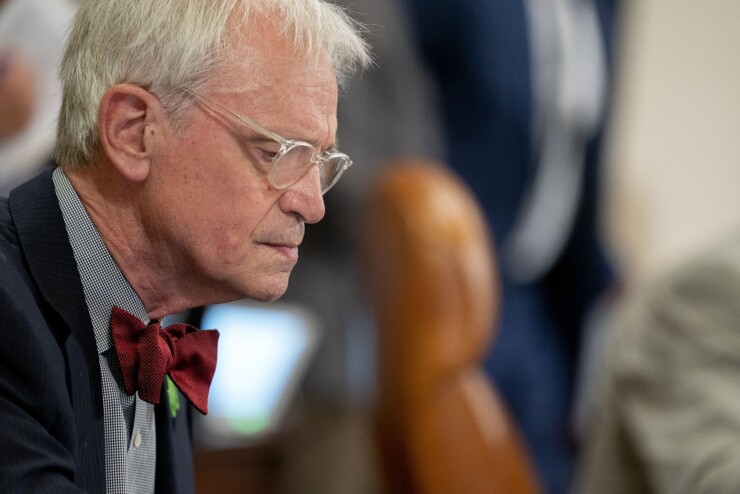Federal officials overseeing the allocation of grants in the infrastructure act will need to resist political pressure to spend the dollars on projects that worsen climate change, said Rep. Earl Blumenauer, D-Oregon.
The $1.2 trillion Infrastructure Investment and Jobs Act is meant to enact the Biden administration's emphasis on equity and environment, but those values could become lost as the federal dollars are doled out, Blumenauer, a member of the House Ways and Means Committee, said Thursday during a webinar on state and city spending on federal infrastructure funds presented by the Volcker Alliance and Penn Institute for Urban Research.
“It can be transformational, but if we don’t do it right, it could actually increase disparities and increase greenhouse gases in sectors, like transportation, that account for most of our carbon pollution,” Blumenauer said.

The infrastructure act features billions of dollars that will be allocated on a grant-level discretionary basis by federal departments, chiefly the Department of Transportation, headed by Pete Buttigieg and Polly Trottenberg, who have both shown a commitment to equitable projects, he said.
“This administration has put forth policies and programs, administered by people who share their values, but there are lots of institutional cross pressures, political efforts, and organized groups that will be pushing for more traditional investment,” Blumenauer said. “It puts the pressure on all of us to work with our metropolitan planning organizations, our transit agencies, to communicate to our state DOTs that we don’t want to just put in the time-honored projects that frankly aren’t going to get us where we need to go.”
States and local governments will have to set aside their own existing political divides if they want to win grant money, said Philadelphia Controller Rebecca Rhynhart. States like Pennsylvania, where Republicans control the Legislature and have historically butted heads with Democrat-run cites like Philadelphia, will have to learn to work together, she said.
“Our state representatives and senators are pushing on the state, and there is advocacy going on,” Rhynhart said. “To me, the tension and the collaboration and the back and forth is what government is. [But] there has to be forward movement.”
The threat of losing out on grant money may prompt officials to overcome their differences, said panelist Patrick Brett, head of Citi’s Municipal Debt Capital Markets and Municipal Securities Rulemaking Board chair.
As the federal dollars start to flow, Citi is expecting an uptick in muni volume, but it may take time, Brett said.
“We do expect to see a pretty significant increase in supply in the muni market as a result of all these investments,” Brett said. “The discretionary grants are a positive thing, but it does take time” for the federal government to develop and evaluate the programs, he said.
If how cities are spending their American Rescue Plan Act dollars is any indication, "transformational" infrastructure projects may be top of mind for many mayors, said David Glick, the faculty director of MetroBridge Program at the Boston University Initiative on Cities.
The 2021 Menino Survey of Mayors, released in late November, shows infrastructure is very high on mayors' to-do lists with the stimulus funds, Glick said.
More than 75% of mayors said they plan to use their ARPA funds for “transformative aims” in infrastructure, housing and homeless, instead of budget gaps, the survey found.
Many mayors said they want to spend on projects that would otherwise be politically difficult to accomplish, while others said they planned to work through their existing list of needs, Glick said.
Infrastructure priorities remained roughly in line with pre-pandemic priorities, Glick said: Roads, bridges, water and broadband.
“It was a mixed bag,” he said. “Overall, it was not a dramatically different set of infrastructure priorities than we’ve gotten in the past, but it was peppered with some different thinking” about equity and climate-change projects.
The survey includes 126 mayors and was taken before the passage of the IIJA.





